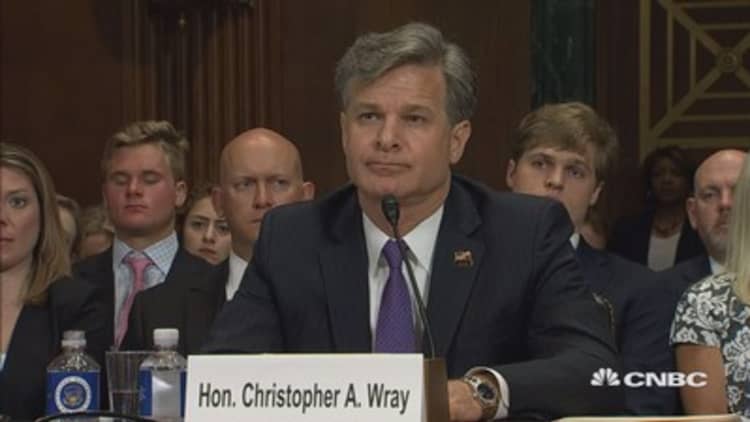
President Donald Trump's pick to lead the FBI pledged independence during a high-stakes Senate hearing Wednesday that follows former FBI Director James Comey's accusation that Trump asked him for loyalty.
"If I am given the honor of leading this agency, I will never allow the FBI's work to be driven by anything other than the facts, the law and the impartial pursuit of justice. Period. Full stop." FBI Director nominee Christopher Wray told the Senate Judiciary Committee.
Wray is a 50-year-old white-collar lawyer who served as assistant attorney general during the George W. Bush administration. If confirmed, he would take over the bureau at a politically charged time, following the White House's portrayals of the FBI as in disarray and Comey's assertion that the Trump administration lied about the bureau and its agents. Throughout the hearing, several senators stressed the importance of restoring public trust in the FBI.
Wray was an assistant attorney general in charge of the criminal division from 2003 to 2005. He is currently a litigation partner at King & Spaulding and represented New Jersey Gov. Chris Christie in the Bridgegate scandal.
Trump terminated Comey in May amid a federal probe into Russian attempts to influence the 2016 election and whether the Trump campaign coordinated with Moscow. Trump later said he ousted Comey while thinking about the "Russia thing."
Loyalty to Trump
Comey testified in June that Trump asked him for loyalty shortly after taking office and later made a statement that Comey interpreted as a request to "drop" an investigation into former national security advisor Michael Flynn. Trump has denied making those statements.
After Comey's ouster, concerns were raised about Trump's potential efforts to interfere with the FBI's independence. An FBI director does not owe a president loyalty.
"No one asked me for any kind of loyalty oath at any point during this process and I sure as heck didn't offer one," Wray said in response to a question from Sen. Patrick Leahy, D-Vermont.
Wray added that he would not give a loyalty oath if asked. Leahy asked what Wray would do if Trump asked him to do anything illegal or unethical.
"First, I would try to talk him out of it, and if it failed, I would resign," he said.
Special counsel investigation
Former FBI Director Robert Mueller, a special counsel appointed by the Department of Justice, is currently overseeing the federal Russia probe.
Wray said he did not talk about Comey's firing with anyone at the White House but did so with Deputy Attorney General Rod Rosenstein, who told him that Mueller was taking over the Russian investigation. Rosenstein appointed Mueller as special counsel in May.
Trump has repeatedly called the Russia investigation a "witch hunt" pushed by Democrats.
"I do not consider Director Mueller to be on a witch hunt," Wray said in response to a question from Sen. Lindsey Graham, R-S.C.
Sen. Dianne Feinstein, D-Calif., asked if Wray would let the Judiciary Committee know if he witnessed or learned of "any efforts to interfere" with Mueller's work.
"Assuming that I can do it legally and appropriately, absolutely. I'm very committed to supporting Director Mueller in the special counsel investigation in whatever way is appropriate for me to do that," Wray said.
Pressed again by Feinstein, he said he "would consult with the appropriate officials to make sure that I'm not jeopardizing an investigation or anything like that. But I would consider an effort to tamper with Director Mueller's investigation to be unacceptable and inappropriate and it would need to be dealt with very sternly and appropriately, indeed."
Clinton email investigation
In a memo to Trump, Rosenstein criticized Comey's handling of the Hillary Clinton email investigation. The White House initially used Comey's conduct in the investigation as justification for firing the FBI director, but Trump later said he would have fired Comey "regardless."
Wray declined repeated requests to say how he would have handled the Clinton case personally. However, he said he could not "imagine" holding a news conference on an individual who had not been prosecuted, as Comey did with Clinton.
In July 2016, Comey publicly said that Clinton was "extremely careless" in handling classified information but added that "no reasonable prosecutor" would bring charges against her.
Election interference
Wray said he had only seen the unclassified U.S. intelligence report on Russian election meddling in January. More than once, he added that he has "no reason" to doubt the intelligence that says the Russian government ordered an effort to influence the 2016 election to harm Clinton and help Trump.
Graham also brought up a Politico report about Ukrainian efforts to aid Clinton, which Wray said he had not seen.
Graham asked Wray about revelations that Donald Trump Jr., Trump's eldest son, went to a meeting with someone portrayed as a "Russian government attorney" seeking dirt on Clinton last year. Wray said he had not seen the specifics about the meeting as he had been meeting with senators ahead of the hearing. Graham pressed him to say that Americans approached with offers like the one given to Trump Jr. should go to the FBI.
"You're going to be director of the FBI, pal. So here's what I want you to tell every politician. If you get a call from somebody suggesting that a foreign government wants to help you by disparaging your opponent, tell us all to call the FBI," Graham said.
Wray responded: "To the members of this committee, any threat or effort to interfere with our elections from any nation-state or any nonstate actor is the kind of thing the FBI would want to know."


